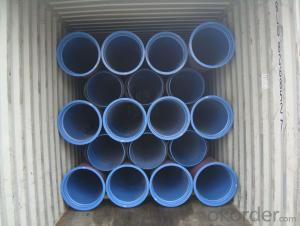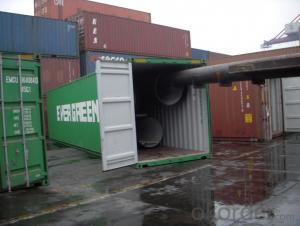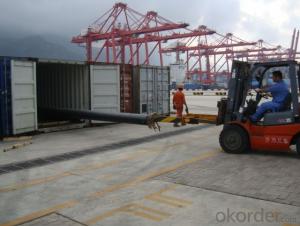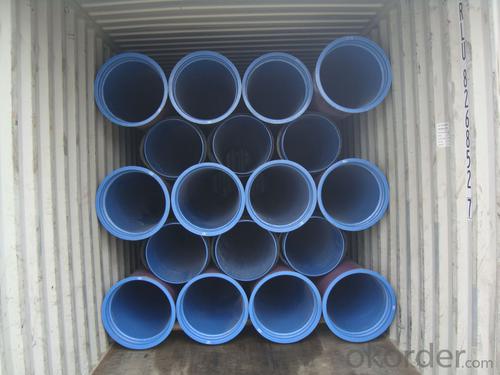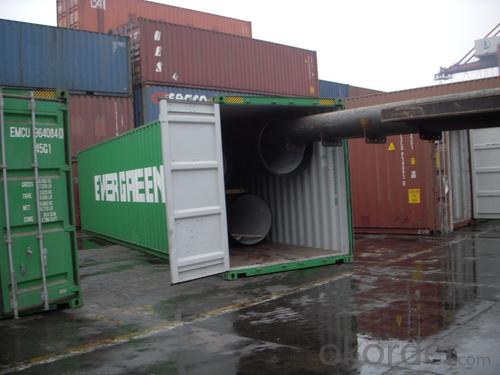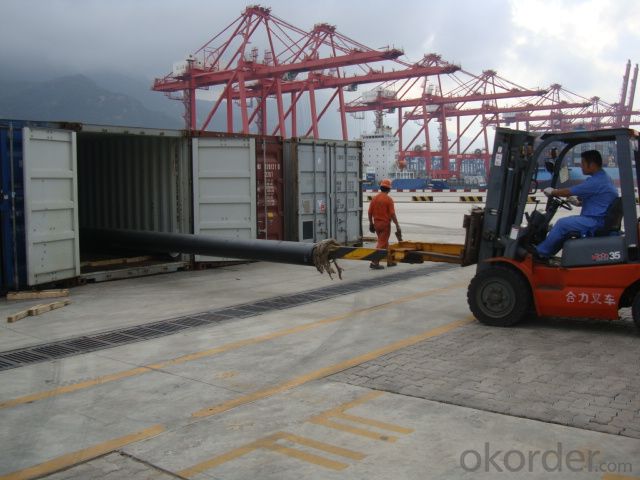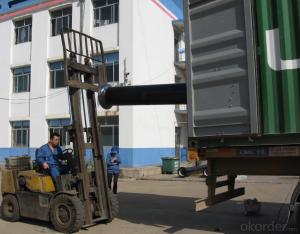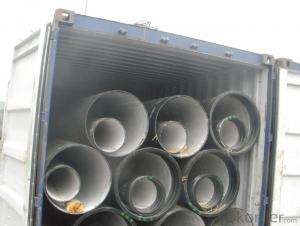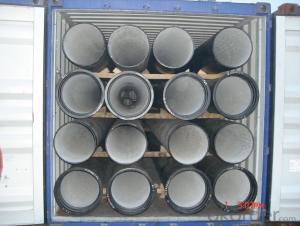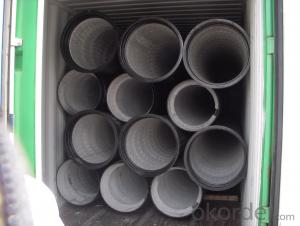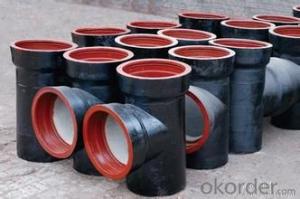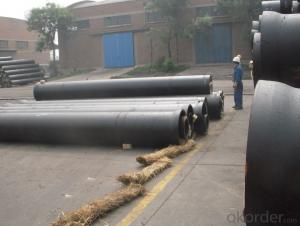DUCTILE IRON PIPES C Class DN1100
- Loading Port:
- China Main Port
- Payment Terms:
- TT OR LC
- Min Order Qty:
- -
- Supply Capability:
- -
OKorder Service Pledge
OKorder Financial Service
You Might Also Like
Ductile Iron Cast Pipe is without any defects compare with tradition casting tech, which has many advantages particularly as follow:
(1) High density. In the "vertical upward casting" process, the melt iron of centre liquid column in center crystallizer is continuously feeding for volume shrinkage caused by condensation tube at outer circumference , which lead to be free of shrinkage porosity.
(2) High purity. When melt iron pouring, the mixed impurities such as gas, dross, sand grain which are lighter than melt iron could be eliminated at furnace mouth, its impossible to enter into the crystallizer through the channel, so the melt iron into the crystallizer is very pure.
(3) Strength with toughness. The cooling speed provided by continuous crystallizer is 30 times than sand casting and 5 times than centrifugal casting, and doesn't produce white iron, the eutectic cell volume of continuous cast iron is one eighth to one tenth compare with traditional cast iron. The density of graphite nodule in ductile iron can reach 300-700 pcs/mm2. Therefore, all reason above improve the strength and toughness of continuous cast iron.
(4) Free machining. The high speed cooling make the hardening phase (such as boride, steadite) not appear like reticular, massive or thick, but diffuse like fish bone and pane in shape, moreover, there are tiny graphite flakes inlaid hardening phase. It's free machining in BrinellHardness the range of 250-300HB. However, the Brinell Hardness of 250 is top limit to common metal materials.
(5) Uniform composition of tube wall. The convection mixing of liquid column caused by marching type drawing in crystallizer make the composition of tube wall well-distributed, and concentration gradient very little.
(6) High productivity. To the wall thickness of tube under 10mm, the speed of continuous casting is 1 meter/min, to the wall thickness of tube under 20mm, the speed of continuous casting is 0.5 meter/min, which is high efficiency that centrifugal or other casting tech couldn't reach.
- Q: Can ductile iron pipes be used in potable water systems?
- Ductile iron pipes are indeed suitable for use in potable water systems. They belong to the cast iron category but possess increased strength and ductility. Their durability, resistance to corrosion, and long lifespan make them a popular choice for water infrastructure, especially potable water systems. These pipes are produced in accordance with specific standards and regulations governing the use of potable water, ensuring the safe transportation of drinking water. Moreover, ductile iron pipes exhibit exceptional flow characteristics, making them well-suited for water distribution systems. All in all, ductile iron pipes are a dependable and frequently employed material in potable water systems.
- Q: Ductile cast iron can replace copper sleeve
- The tensile and compressive capacity of the ball milled cast iron is not as good as that of copper. The hardness of Rongchang graphite copper sheath can reach HB210
- Q: How are ductile iron pipes connected?
- There are several methods commonly used to connect ductile iron pipes, including flanged joints, mechanical joints, and push-on joints. Flanged joints involve connecting two sections of pipe by using a flanged coupling. The pipe ends have flanges that are securely bolted together, creating a connection that is both strong and leak-proof. This method is often used for pipes with larger diameters or in situations where a rigid joint is necessary. Mechanical joints use a mechanical joint gland and rubber gasket to create a seal that is watertight. The ends of the pipes are inserted into the gland, and then bolts are tightened to compress the gasket, ensuring a reliable connection. This method is frequently employed in water distribution systems because it is flexible and easy to install. Push-on joints utilize a rubber gasket to create a tight seal between sections of pipe. The gasket is placed in a groove on one end of a pipe, and then the other pipe is pushed onto it, resulting in a compression seal. This method is quick and straightforward, making it suitable for a variety of applications, such as sewer systems and underground piping. Ultimately, the choice of connection method for ductile iron pipes depends on factors such as pipe diameter, application requirements, and installation conditions. It is of utmost importance to adhere to the manufacturer's recommendations and industry standards to ensure proper installation and dependable performance.
- Q: Are ductile iron pipes suitable for pressure sewer systems?
- Yes, ductile iron pipes are suitable for pressure sewer systems. Ductile iron pipes have excellent strength and durability, making them capable of withstanding high pressure and stress levels. Additionally, they have a smooth interior surface that promotes efficient flow and reduces the risk of clogs. These qualities make ductile iron pipes a reliable choice for pressure sewer systems.
- Q: Is nodular cast iron pipe filled with Yau Ma Tei?
- In many areas of our country, ductile iron pipe in the middle and small diameter to tube connected with the tube, the bearing type or flange interface method; ductile iron, angle limit must be allowed better seismic performance and sealing performance.
- Q: DN1800 can the length of ductile iron pipes be several meters? What is the total weight?
- Ductile cast iron pipe after annealing, the microstructure is ferrite and pearlite, good mechanical properties, excellent corrosion resistance, good ductility, good sealing effect, simple installation, mainly for municipal, industrial and mining enterprises, water supply, gas, oil etc..
- Q: How do ductile iron pipes perform in earthquake-induced ground movements?
- Ductile iron pipes have proven to be a reliable and resilient choice for underground infrastructure, including in areas prone to earthquake-induced ground movements. The unique properties of ductile iron, such as its strength and flexibility, allow it to withstand the effects of ground movements during an earthquake. During an earthquake, the ground experiences shaking and shifting, which can exert significant forces on underground pipes. Ductile iron pipes have the ability to flex under these forces, absorbing the energy and reducing the risk of failure. They can withstand substantial ground movements without cracking or breaking, which ensures the continued flow of water or other fluids. In addition, ductile iron pipes have excellent resistance to corrosion and are highly durable, making them suitable for long-term use in earthquake-prone areas. This reduces the need for frequent maintenance or replacement, providing cost-effective and reliable infrastructure solutions. Furthermore, the joints used in ductile iron pipe installations are designed to accommodate movement and allow for slight adjustments during ground shifts. This flexibility prevents the pipes from becoming dislodged or separated, maintaining the integrity of the system. Overall, ductile iron pipes have a proven track record of performance in earthquake-induced ground movements. They offer resilience, flexibility, and durability, ensuring the continuous functioning of water and sewer systems even in areas prone to seismic activity.
- Q: What material is ductile cast iron 235A?
- Nodular cast iron by spheroidization and inoculation by spherical graphite, effectively improve the mechanical properties of cast iron, especially the plasticity and toughness increased, resulting in higher than carbon steel. The strength of nodular cast iron is a kind of high strength cast iron material developed in 50s twentieth Century, its comprehensive performance is close to the steel. It is based on its excellent performance, has been successfully used in casting complex stress, strength, toughness and wear resistance requirements of the higher parts. Ductile iron has been the rapid development of cast iron material for application of gray cast iron, only very widely. The so-called "iron steel", mainly refers to the ductile iron.
- Q: Can ductile iron pipes be used for pressure surge applications?
- Yes, ductile iron pipes can be used for pressure surge applications. Ductile iron is known for its high strength and durability, making it suitable for handling pressure surges caused by water hammer or other transient events. It has the ability to absorb and withstand these sudden pressure changes without experiencing significant damage or failure. However, proper design considerations and installation techniques should be followed to ensure the safe and effective use of ductile iron pipes in pressure surge applications.
- Q: Are ductile iron pipes suitable for use in seismic areas?
- Yes, ductile iron pipes are suitable for use in seismic areas. Ductile iron is a strong and durable material that can withstand seismic forces and ground movements associated with earthquakes. Its flexibility and high tensile strength make it resistant to cracking or breaking under extreme conditions. Additionally, ductile iron pipes have been successfully used in seismic areas for many years, proving their reliability and suitability. However, it is important to ensure that proper installation techniques and seismic design guidelines are followed to maximize their performance and minimize any potential risks.
Send your message to us
DUCTILE IRON PIPES C Class DN1100
- Loading Port:
- China Main Port
- Payment Terms:
- TT OR LC
- Min Order Qty:
- -
- Supply Capability:
- -
OKorder Service Pledge
OKorder Financial Service
Similar products
Hot products
Hot Searches
Related keywords
